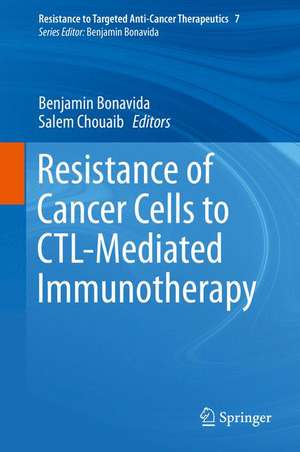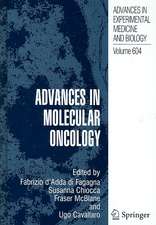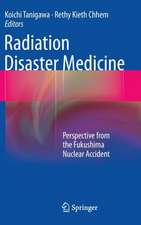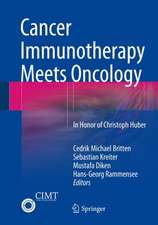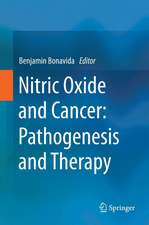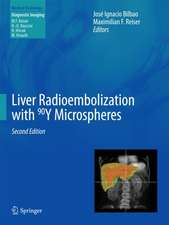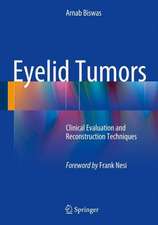Resistance of Cancer Cells to CTL-Mediated Immunotherapy: Resistance to Targeted Anti-Cancer Therapeutics, cartea 7
Editat de Benjamin Bonavida, Salem Chouaiben Limba Engleză Hardback – 30 iun 2015
Din seria Resistance to Targeted Anti-Cancer Therapeutics
- 5%
 Preț: 718.10 lei
Preț: 718.10 lei - 5%
 Preț: 1107.21 lei
Preț: 1107.21 lei - 5%
 Preț: 1096.10 lei
Preț: 1096.10 lei - 5%
 Preț: 1100.30 lei
Preț: 1100.30 lei - 5%
 Preț: 1093.35 lei
Preț: 1093.35 lei - 5%
 Preț: 1103.22 lei
Preț: 1103.22 lei - 5%
 Preț: 1093.88 lei
Preț: 1093.88 lei - 5%
 Preț: 1099.35 lei
Preț: 1099.35 lei - 5%
 Preț: 1096.10 lei
Preț: 1096.10 lei - 5%
 Preț: 841.00 lei
Preț: 841.00 lei - 5%
 Preț: 715.91 lei
Preț: 715.91 lei - 5%
 Preț: 714.83 lei
Preț: 714.83 lei - 5%
 Preț: 1093.88 lei
Preț: 1093.88 lei - 5%
 Preț: 712.25 lei
Preț: 712.25 lei - 5%
 Preț: 1024.59 lei
Preț: 1024.59 lei - 5%
 Preț: 723.57 lei
Preț: 723.57 lei - 5%
 Preț: 721.19 lei
Preț: 721.19 lei - 5%
 Preț: 721.19 lei
Preț: 721.19 lei - 5%
 Preț: 723.21 lei
Preț: 723.21 lei - 5%
 Preț: 717.73 lei
Preț: 717.73 lei
Preț: 726.68 lei
Preț vechi: 764.93 lei
-5% Nou
Puncte Express: 1090
Preț estimativ în valută:
139.05€ • 145.57$ • 115.05£
139.05€ • 145.57$ • 115.05£
Carte tipărită la comandă
Livrare economică 05-19 aprilie
Preluare comenzi: 021 569.72.76
Specificații
ISBN-13: 9783319178066
ISBN-10: 3319178067
Pagini: 333
Ilustrații: XIX, 353 p. 38 illus., 27 illus. in color.
Dimensiuni: 155 x 235 x 22 mm
Greutate: 0.69 kg
Ediția:2015
Editura: Springer International Publishing
Colecția Springer
Seria Resistance to Targeted Anti-Cancer Therapeutics
Locul publicării:Cham, Switzerland
ISBN-10: 3319178067
Pagini: 333
Ilustrații: XIX, 353 p. 38 illus., 27 illus. in color.
Dimensiuni: 155 x 235 x 22 mm
Greutate: 0.69 kg
Ediția:2015
Editura: Springer International Publishing
Colecția Springer
Seria Resistance to Targeted Anti-Cancer Therapeutics
Locul publicării:Cham, Switzerland
Public țintă
ResearchCuprins
1 Resistance of Cancer Stem Cells to Cell-mediated Immune Responses .-2 Role of Co-inhibitory Molecules in Tumor Escape from CTL attack.-3 Role of the Non-classical HLA Class I Antigens for Immune Escape .-4 Integrins: Friends or Foes of Antitumor Cytotoxic T Lymphocyte Response.-5 Cytotoxic T Lymphocytes and Their Granzymes: An Overview.-6 Hypoxia: A Formidable Saboteur of the Anti-tumor Response.-7 Mechanisms and Modulation of Tumor Microenvironment-Induced Immune Resistance .-8 Evasion of Cytotoxic Lymphocyte and Pulmonary Macrophage Mediated Immune Responses in Lung Cancer.-9 Sensitization of Immune-Resistant Tumor Cells to CTL-mediated Apoptosis via Interference at the Dysregulated NF-κB/Snail/YY1/PI3K/RKIP/PTEN Resistant Loop.-10 Overcoming Cancer Cell Resistance to Death Receptor Targeted Therapies.-11 Pancreatic Cancer Resistance to TRAIL Therapy: Regulators of the Death Inducing Signaling Complex.-12 Resistance of Carcinoma Cells to CTL-mediated Immunotherapy.-13 Cancer Induced Immunosuppression and its Modulation by Signal Inhibitors.-14 Quality of CTL Therapies: A Changing Landscape.
Notă biografică
Benjamin Bonavida, Ph.D., is Professor, UCLA David Geffen School of Medicine for the Department of Microbiology, Immunology & Molecular Genetics. He is also Member, Department of Defense Congressionally Directed Medical Research Program, Member, National Cancer Institute SPORE Program, Member, International Scientific Advisory Board of the Israel Cancer Research Foundation, among other accomplishments. He is currently a scientific reviewer for several journals and a member of editorial boards including Journal of Clinical Immunology, International Journal of Oncology, and Cancer Biotherapy & Radiopharmaceuticals. He has published over 450 papers and reviews, has received more than 7,980 citations, and has edited four Springer volumes.
Salem Chouaib, Ph.D., is Head, Cancer Immunology Division at Institut Gustave Roussy. His research focuses on augmenting cytotoxic T cell immunity and studies how tumors evade the immune system. Dr. Chouaib has published more than 239 scientific papers and reviews, and has received more than 5,490 citations.
Salem Chouaib, Ph.D., is Head, Cancer Immunology Division at Institut Gustave Roussy. His research focuses on augmenting cytotoxic T cell immunity and studies how tumors evade the immune system. Dr. Chouaib has published more than 239 scientific papers and reviews, and has received more than 5,490 citations.
Textul de pe ultima copertă
This book, written by leading investigators, brings together the latest knowledge about key aspects of the most rapidly progressing fields of tumor escape and tumor resistance to CTL. Readers will benefit from a collection of outstanding surveys that cover some factors regulating resistance to CTL cytotoxicity, the influence of tumor microenvironment, and the resistance to death ligands, mediated apoptosis, and means to reverse resistance. This remarkable volume also emphasizes the future directions that may lead to the design of more innovative, refined, and integrative immunotherapies to target tumor plasticity and heterogeneity, and help to overcome the inherent limitations of current treatments. By providing a broad scope of innovative concepts in the burgeoning field of cancer biology and immunotherapy, this volume will be of exceptional interest and a valuable reference for scientists, clinicians, health professionals, and biopharmaceutical companies working in the field of cancer immunotherapy.
Caracteristici
Explores the inhibition of CTL-cytotoxic function by tumor-derived T-regulatory cells, along with the inhibition of cytotoxic function by tumor induction of hypoxia Discusses the overexpression of transcription factors that regulate resistance Appeals to cancer researchers, biologists and immunologists
